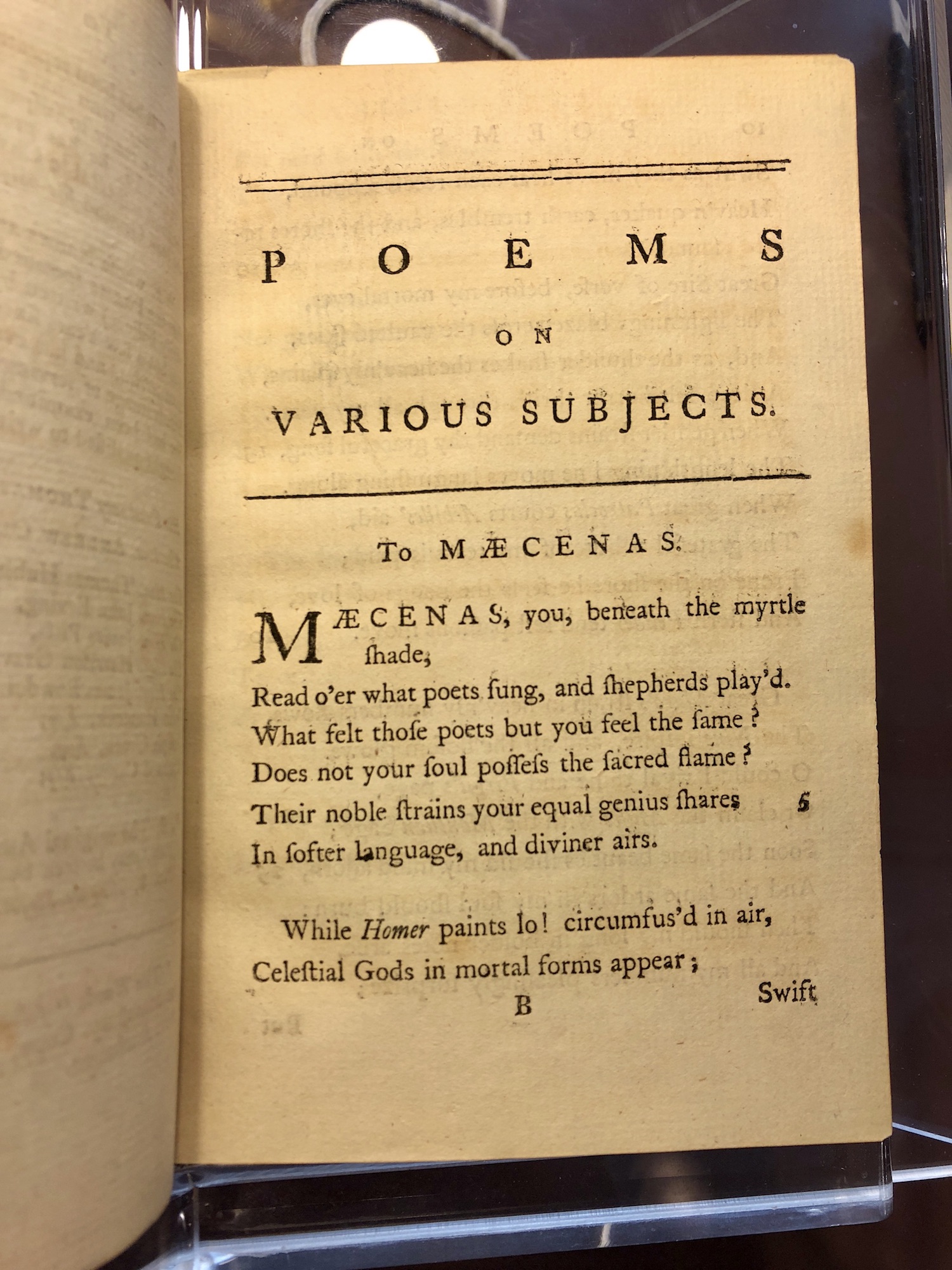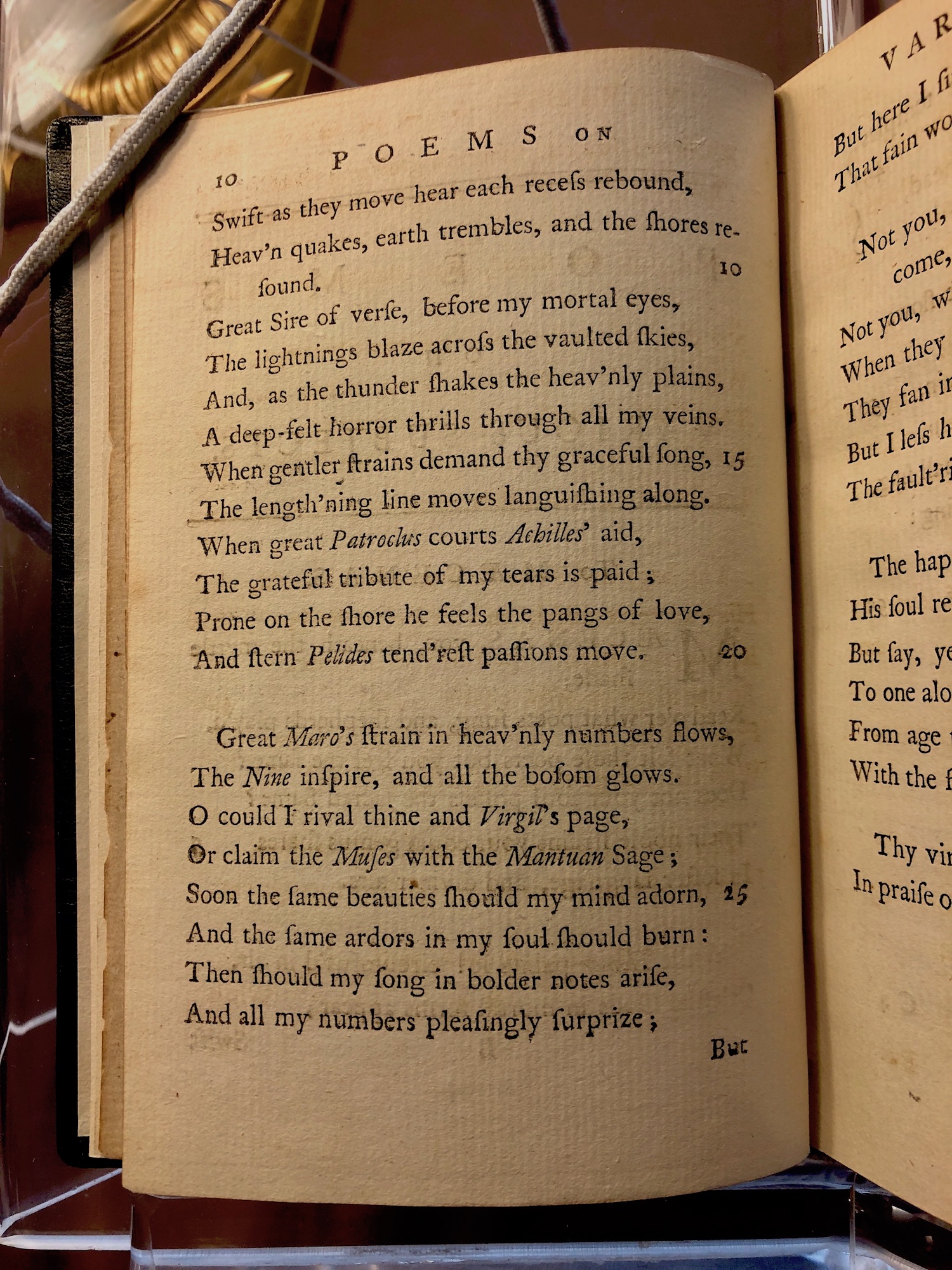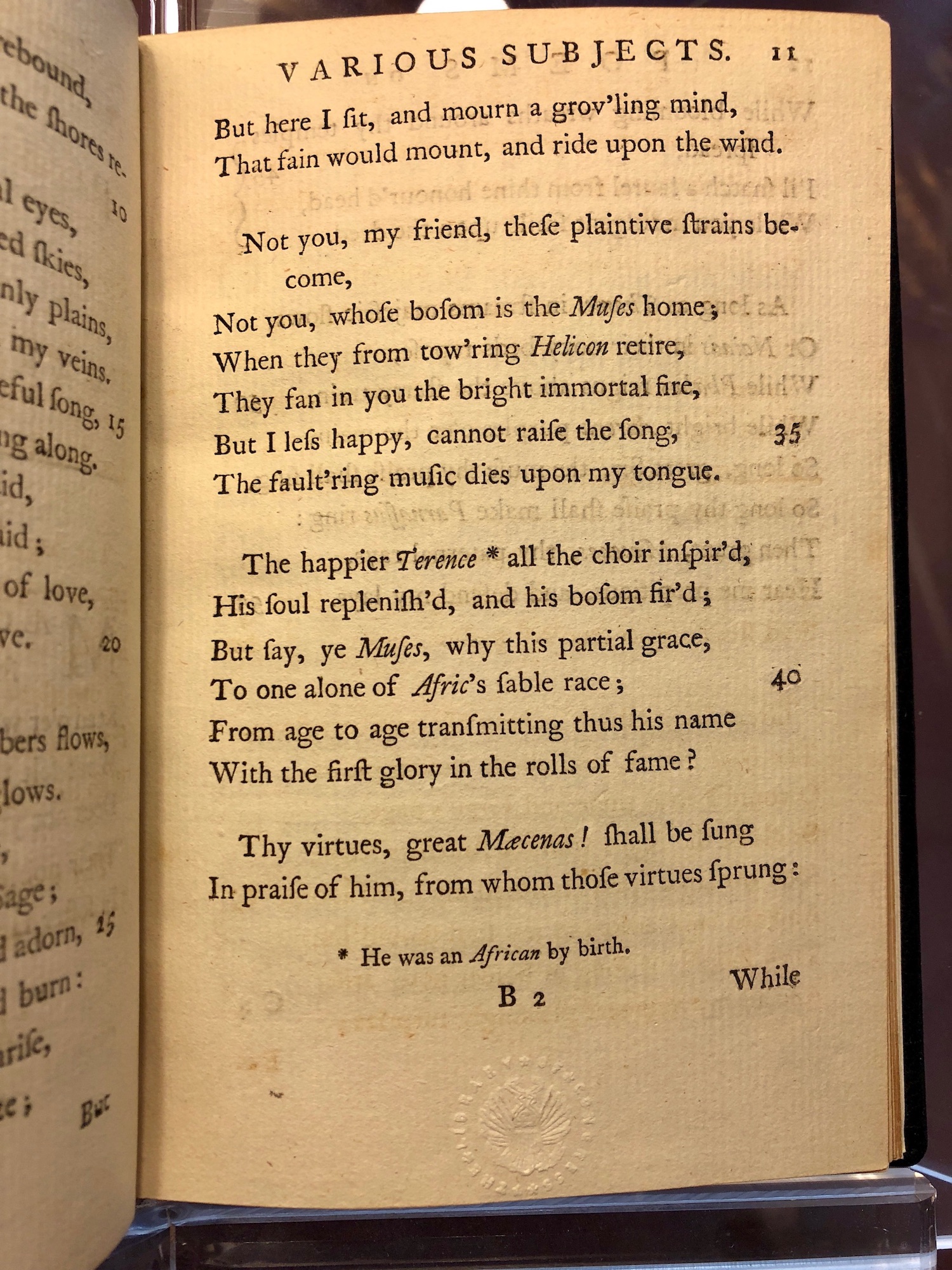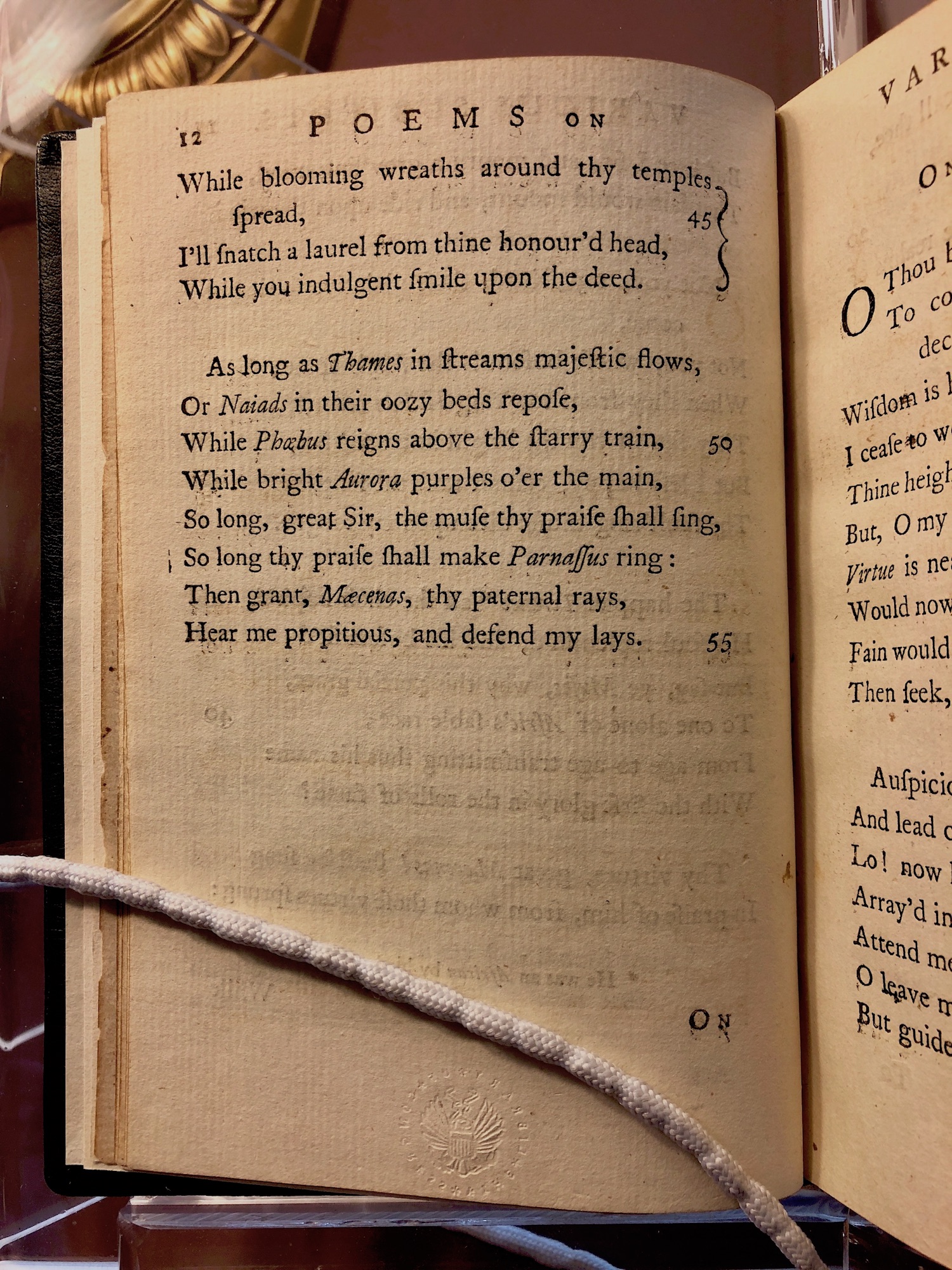"To Maecenas"
By
Phillis Wheatley
Transcription, correction, editorial commentary, and markup by Students of Marymount University, James West, Amy Ridderhof
Maecenas Source: page from first edition of Wheatley's poemsMaecenas was the wealthy patron of classical Roman
poets Virgil and Horace, whom Wheatley draws on in complex ways. Wheatley's
poem "To Maecenas" opens her collection, which position gives it a powerful
significance as she claims the right to speak within this tradition. Like Horace's Odes to Maecenas, Wheatley's offers praise to her patron,
but does so in ways that are fraught with the equivocalities of being an
enslaved African working within the languge and culture of the colonial master. For a deeper
reading of "To Maecenas," see Paula Bennett's journal article, "Phillis
Wheatley's Vocation and the Paradox of the 'Afric Muse.'" Following other
scholars, Bennett identifies Wheatley's poet-patron as Mather Byles, one of the
signatories verifying her authorship. The image included here shows the
attestation to the public, included in the 1773 edition of Wheatley's poems,
certifying that they were indeed written by "PHILLIS, a young Negro Girl, who
was but a few Years since, brought an uncultivated Barbarian from Africa,...and now is, under the Disadvantage of serving
as a Slave in a Family in [Boston]." Note Bales' name. - [TH]HomerHomer is the ancient Greek poet of The
Oddyssey and The Illiad. - [TH]Patroclus
Source: page from first edition of Wheatley's poemsMaecenas was the wealthy patron of classical Roman
poets Virgil and Horace, whom Wheatley draws on in complex ways. Wheatley's
poem "To Maecenas" opens her collection, which position gives it a powerful
significance as she claims the right to speak within this tradition. Like Horace's Odes to Maecenas, Wheatley's offers praise to her patron,
but does so in ways that are fraught with the equivocalities of being an
enslaved African working within the languge and culture of the colonial master. For a deeper
reading of "To Maecenas," see Paula Bennett's journal article, "Phillis
Wheatley's Vocation and the Paradox of the 'Afric Muse.'" Following other
scholars, Bennett identifies Wheatley's poet-patron as Mather Byles, one of the
signatories verifying her authorship. The image included here shows the
attestation to the public, included in the 1773 edition of Wheatley's poems,
certifying that they were indeed written by "PHILLIS, a young Negro Girl, who
was but a few Years since, brought an uncultivated Barbarian from Africa,...and now is, under the Disadvantage of serving
as a Slave in a Family in [Boston]." Note Bales' name. - [TH]HomerHomer is the ancient Greek poet of The
Oddyssey and The Illiad. - [TH]Patroclus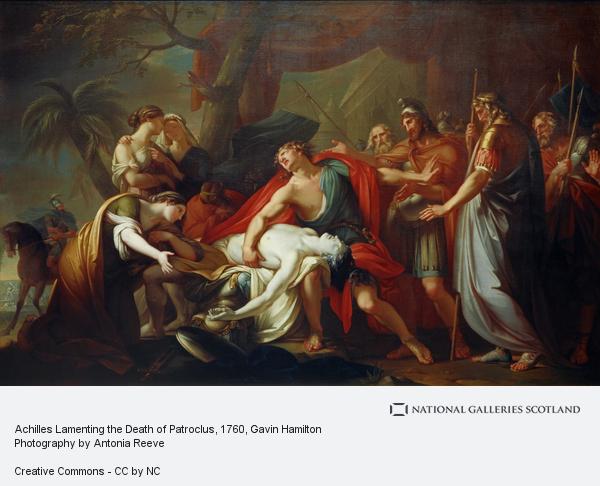 Source: Achilles Lamenting the death of PatroclusAchilles is the main character of The Illiad, which tells the story of the Trojan War and, specifically,
Achilles' wrath. Achilles and Patroclus are lovers and friends; angered by
Agammemnon, Achilles refuses to fight, but allows Patroclus to wear his armor
and lead the Myrmidons against the Trojans. When Patroclus is killed by Hector,
Achilles is grief-stricken and, enraged, he returns to battle to destroy the
Trojans. The image included here, Gavin Hamilton's Achilles
Lamenting the Death of Patroclus (1760-1763), is housed in National Galleries, Scotland. - [TH]PelidesPelides is Achilles' father; therefore, it is also
another way of referring to Achilles himself. Achilles is frequently described
as "stern" by Homer. - [TH]MaroPublius Vergilius Maro, more commonly known as Virgil,
the Augustan Roman poet famed for his Eclogues and the epic poem The Aeneid. - [TH]nineThe nine muses in Greco-Roman mythology are goddesses,
daughters of Zeus and Mnemosyne who inspire those in the arts and
sciences. - [TH]MantuaMantua is a city in Italy,
and the home of Virgil; the Mantuan sage is the poet Virgil. - [TH]fainMeaning "[g]ladly,
willingly, with pleasure," according to the OED (fain, adv.B). - [TH]HeliconMount Helicon in Greece is a mountain believed to be the
home of the muses and hence a place sacred to poetry. - [TH]falteringAn alternate spelling and
contraction, for meter, of "faltering," meaning unsteady or staggering. - [TH]TerencePublius Terentius Afer, better known as
Terence, is a famous Roman comic playwright, born in northern Africa. As the
Encylopedia Britannicanotes, Terence was enslaved and later
freed by a Roman senator. Wheatley suggests a connection between herself and
Terence, both of African origin; yet, Terence is "happier"--both in his poetic
skill, and perhaps also in having been freed. - [TH]laurel
Source: Achilles Lamenting the death of PatroclusAchilles is the main character of The Illiad, which tells the story of the Trojan War and, specifically,
Achilles' wrath. Achilles and Patroclus are lovers and friends; angered by
Agammemnon, Achilles refuses to fight, but allows Patroclus to wear his armor
and lead the Myrmidons against the Trojans. When Patroclus is killed by Hector,
Achilles is grief-stricken and, enraged, he returns to battle to destroy the
Trojans. The image included here, Gavin Hamilton's Achilles
Lamenting the Death of Patroclus (1760-1763), is housed in National Galleries, Scotland. - [TH]PelidesPelides is Achilles' father; therefore, it is also
another way of referring to Achilles himself. Achilles is frequently described
as "stern" by Homer. - [TH]MaroPublius Vergilius Maro, more commonly known as Virgil,
the Augustan Roman poet famed for his Eclogues and the epic poem The Aeneid. - [TH]nineThe nine muses in Greco-Roman mythology are goddesses,
daughters of Zeus and Mnemosyne who inspire those in the arts and
sciences. - [TH]MantuaMantua is a city in Italy,
and the home of Virgil; the Mantuan sage is the poet Virgil. - [TH]fainMeaning "[g]ladly,
willingly, with pleasure," according to the OED (fain, adv.B). - [TH]HeliconMount Helicon in Greece is a mountain believed to be the
home of the muses and hence a place sacred to poetry. - [TH]falteringAn alternate spelling and
contraction, for meter, of "faltering," meaning unsteady or staggering. - [TH]TerencePublius Terentius Afer, better known as
Terence, is a famous Roman comic playwright, born in northern Africa. As the
Encylopedia Britannicanotes, Terence was enslaved and later
freed by a Roman senator. Wheatley suggests a connection between herself and
Terence, both of African origin; yet, Terence is "happier"--both in his poetic
skill, and perhaps also in having been freed. - [TH]laurel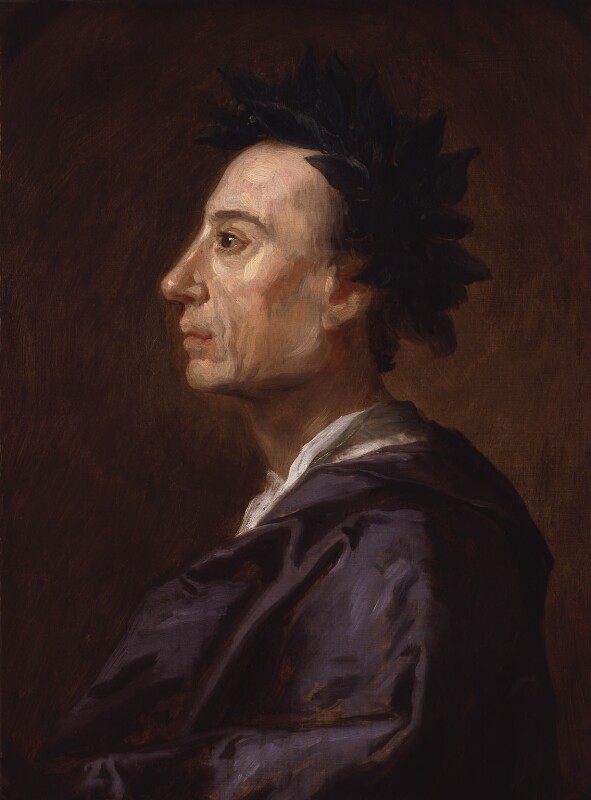 Source: Portrait of Alexander Pope by Jonathan RichardsonThe leaves of the bay laurel tree were a
conventional symbol of poetic fame and acheivement originating in the
mythological tale of Daphne and
Apollo. The image included here is a portrait of the 18th century poet
Alexander Pope, wearing a crown of laurel. The portrait (c.1737), by Jonathan
Richardson, is housed in the National
Portrait Gallery, London. - [TH]ThamesThe Thames is a major river flowing
through southern England and London. - [TH]Naiads
Source: Portrait of Alexander Pope by Jonathan RichardsonThe leaves of the bay laurel tree were a
conventional symbol of poetic fame and acheivement originating in the
mythological tale of Daphne and
Apollo. The image included here is a portrait of the 18th century poet
Alexander Pope, wearing a crown of laurel. The portrait (c.1737), by Jonathan
Richardson, is housed in the National
Portrait Gallery, London. - [TH]ThamesThe Thames is a major river flowing
through southern England and London. - [TH]Naiads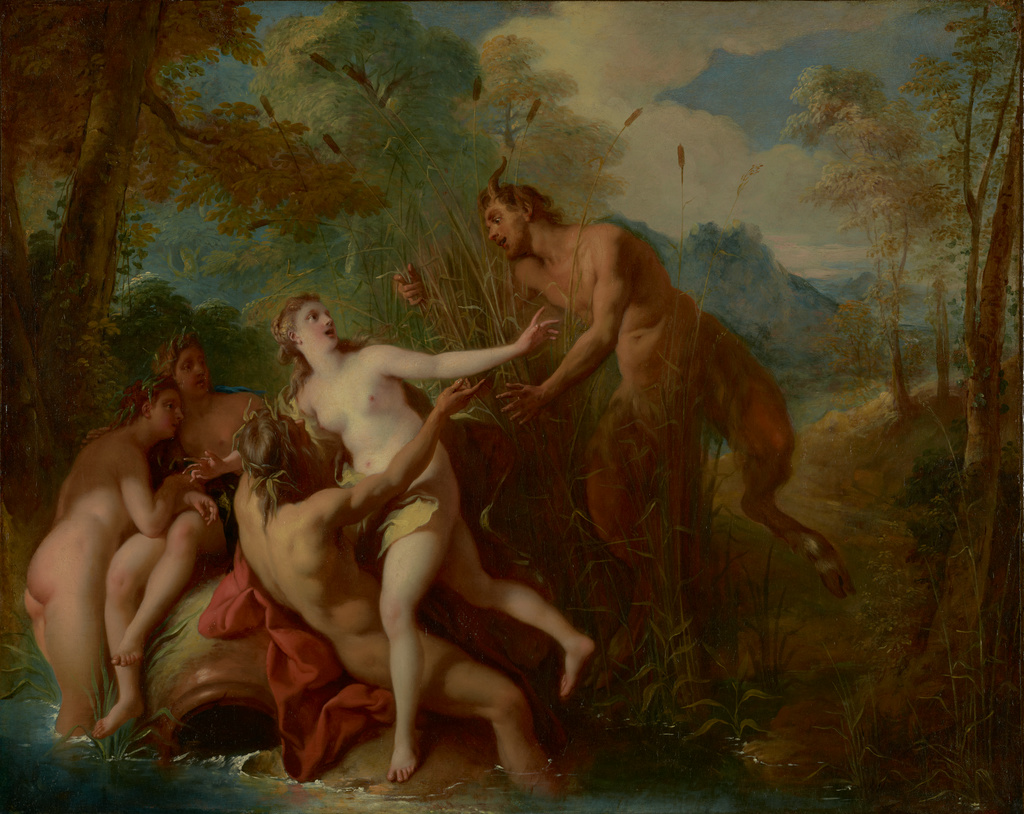 Source: Jean-Francois de Troy, 'Pan and Syrinx' (1722-1724)/>In Greco-Roman
mythology, naiads are female freshwater nymphs. The image included here, by
Jean-Francois de Troy, shows part of the Ovidian story of Pan and Syrinx
(1722-1724). De Troy's Pan and Syrinx is housed in the
Getty Museum. - [TH]ApolloPhoebus Apollo is an important god in the Greco-Roman
tradition. He is associated with both the sun and with music and poetry. - [TH]AuroraIn Greco-Roman mythology, Aurora (called Eos in the
Greek) personifies the dawn. - [TH]ParnassusParnassus is a mountain in Greece that
was seen as the home of the gods, particularly Dionysus and Apollo, as well as
the Muses. The Muses are also associated with Mount Helicon. - [TH]
Source: Jean-Francois de Troy, 'Pan and Syrinx' (1722-1724)/>In Greco-Roman
mythology, naiads are female freshwater nymphs. The image included here, by
Jean-Francois de Troy, shows part of the Ovidian story of Pan and Syrinx
(1722-1724). De Troy's Pan and Syrinx is housed in the
Getty Museum. - [TH]ApolloPhoebus Apollo is an important god in the Greco-Roman
tradition. He is associated with both the sun and with music and poetry. - [TH]AuroraIn Greco-Roman mythology, Aurora (called Eos in the
Greek) personifies the dawn. - [TH]ParnassusParnassus is a mountain in Greece that
was seen as the home of the gods, particularly Dionysus and Apollo, as well as
the Muses. The Muses are also associated with Mount Helicon. - [TH]
 Source: Achilles Lamenting the death of PatroclusAchilles is the main character of The Illiad, which tells the story of the Trojan War and, specifically,
Achilles' wrath. Achilles and Patroclus are lovers and friends; angered by
Agammemnon, Achilles refuses to fight, but allows Patroclus to wear his armor
and lead the Myrmidons against the Trojans. When Patroclus is killed by Hector,
Achilles is grief-stricken and, enraged, he returns to battle to destroy the
Trojans. The image included here, Gavin Hamilton's Achilles
Lamenting the Death of Patroclus (1760-1763), is housed in National Galleries, Scotland. - [TH]PelidesPelides is Achilles' father; therefore, it is also
another way of referring to Achilles himself. Achilles is frequently described
as "stern" by Homer. - [TH]MaroPublius Vergilius Maro, more commonly known as Virgil,
the Augustan Roman poet famed for his Eclogues and the epic poem The Aeneid. - [TH]nineThe nine muses in Greco-Roman mythology are goddesses,
daughters of Zeus and Mnemosyne who inspire those in the arts and
sciences. - [TH]MantuaMantua is a city in Italy,
and the home of Virgil; the Mantuan sage is the poet Virgil. - [TH]fainMeaning "[g]ladly,
willingly, with pleasure," according to the OED (fain, adv.B). - [TH]HeliconMount Helicon in Greece is a mountain believed to be the
home of the muses and hence a place sacred to poetry. - [TH]falteringAn alternate spelling and
contraction, for meter, of "faltering," meaning unsteady or staggering. - [TH]TerencePublius Terentius Afer, better known as
Terence, is a famous Roman comic playwright, born in northern Africa. As the
Encylopedia Britannicanotes, Terence was enslaved and later
freed by a Roman senator. Wheatley suggests a connection between herself and
Terence, both of African origin; yet, Terence is "happier"--both in his poetic
skill, and perhaps also in having been freed. - [TH]laurel
Source: Achilles Lamenting the death of PatroclusAchilles is the main character of The Illiad, which tells the story of the Trojan War and, specifically,
Achilles' wrath. Achilles and Patroclus are lovers and friends; angered by
Agammemnon, Achilles refuses to fight, but allows Patroclus to wear his armor
and lead the Myrmidons against the Trojans. When Patroclus is killed by Hector,
Achilles is grief-stricken and, enraged, he returns to battle to destroy the
Trojans. The image included here, Gavin Hamilton's Achilles
Lamenting the Death of Patroclus (1760-1763), is housed in National Galleries, Scotland. - [TH]PelidesPelides is Achilles' father; therefore, it is also
another way of referring to Achilles himself. Achilles is frequently described
as "stern" by Homer. - [TH]MaroPublius Vergilius Maro, more commonly known as Virgil,
the Augustan Roman poet famed for his Eclogues and the epic poem The Aeneid. - [TH]nineThe nine muses in Greco-Roman mythology are goddesses,
daughters of Zeus and Mnemosyne who inspire those in the arts and
sciences. - [TH]MantuaMantua is a city in Italy,
and the home of Virgil; the Mantuan sage is the poet Virgil. - [TH]fainMeaning "[g]ladly,
willingly, with pleasure," according to the OED (fain, adv.B). - [TH]HeliconMount Helicon in Greece is a mountain believed to be the
home of the muses and hence a place sacred to poetry. - [TH]falteringAn alternate spelling and
contraction, for meter, of "faltering," meaning unsteady or staggering. - [TH]TerencePublius Terentius Afer, better known as
Terence, is a famous Roman comic playwright, born in northern Africa. As the
Encylopedia Britannicanotes, Terence was enslaved and later
freed by a Roman senator. Wheatley suggests a connection between herself and
Terence, both of African origin; yet, Terence is "happier"--both in his poetic
skill, and perhaps also in having been freed. - [TH]laurel Source: Portrait of Alexander Pope by Jonathan RichardsonThe leaves of the bay laurel tree were a
conventional symbol of poetic fame and acheivement originating in the
mythological tale of Daphne and
Apollo. The image included here is a portrait of the 18th century poet
Alexander Pope, wearing a crown of laurel. The portrait (c.1737), by Jonathan
Richardson, is housed in the National
Portrait Gallery, London. - [TH]ThamesThe Thames is a major river flowing
through southern England and London. - [TH]Naiads
Source: Portrait of Alexander Pope by Jonathan RichardsonThe leaves of the bay laurel tree were a
conventional symbol of poetic fame and acheivement originating in the
mythological tale of Daphne and
Apollo. The image included here is a portrait of the 18th century poet
Alexander Pope, wearing a crown of laurel. The portrait (c.1737), by Jonathan
Richardson, is housed in the National
Portrait Gallery, London. - [TH]ThamesThe Thames is a major river flowing
through southern England and London. - [TH]Naiads Source: Jean-Francois de Troy, 'Pan and Syrinx' (1722-1724)/>In Greco-Roman
mythology, naiads are female freshwater nymphs. The image included here, by
Jean-Francois de Troy, shows part of the Ovidian story of Pan and Syrinx
(1722-1724). De Troy's Pan and Syrinx is housed in the
Getty Museum. - [TH]ApolloPhoebus Apollo is an important god in the Greco-Roman
tradition. He is associated with both the sun and with music and poetry. - [TH]AuroraIn Greco-Roman mythology, Aurora (called Eos in the
Greek) personifies the dawn. - [TH]ParnassusParnassus is a mountain in Greece that
was seen as the home of the gods, particularly Dionysus and Apollo, as well as
the Muses. The Muses are also associated with Mount Helicon. - [TH]
Source: Jean-Francois de Troy, 'Pan and Syrinx' (1722-1724)/>In Greco-Roman
mythology, naiads are female freshwater nymphs. The image included here, by
Jean-Francois de Troy, shows part of the Ovidian story of Pan and Syrinx
(1722-1724). De Troy's Pan and Syrinx is housed in the
Getty Museum. - [TH]ApolloPhoebus Apollo is an important god in the Greco-Roman
tradition. He is associated with both the sun and with music and poetry. - [TH]AuroraIn Greco-Roman mythology, Aurora (called Eos in the
Greek) personifies the dawn. - [TH]ParnassusParnassus is a mountain in Greece that
was seen as the home of the gods, particularly Dionysus and Apollo, as well as
the Muses. The Muses are also associated with Mount Helicon. - [TH]9
TO MAECENAS.
1MAECENASMaecenasMaecenas Source: page from first edition of Wheatley's poemsMaecenas was the wealthy patron of classical Roman
poets Virgil and Horace, whom Wheatley draws on in complex ways. Wheatley's
poem "To Maecenas" opens her collection, which position gives it a powerful
significance as she claims the right to speak within this tradition. Like Horace's Odes to Maecenas, Wheatley's offers praise to her patron,
but does so in ways that are fraught with the equivocalities of being an
enslaved African working within the languge and culture of the colonial master. For a deeper
reading of "To Maecenas," see Paula Bennett's journal article, "Phillis
Wheatley's Vocation and the Paradox of the 'Afric Muse.'" Following other
scholars, Bennett identifies Wheatley's poet-patron as Mather Byles, one of the
signatories verifying her authorship. The image included here shows the
attestation to the public, included in the 1773 edition of Wheatley's poems,
certifying that they were indeed written by "PHILLIS, a young Negro Girl, who
was but a few Years since, brought an uncultivated Barbarian from Africa,...and now is, under the Disadvantage of serving
as a Slave in a Family in [Boston]." Note Bales' name. - [TH], you, beneath the myrtle shade,
2Read o'er what poets sung, and shepherds play'd.
3What felt those poets but you feel the same?
4Does not your soul possess the sacred flame?
5Their noble strains your equal genius shares
6In softer language, and diviner airs.
7While HomerHomerHomerHomer is the ancient Greek poet of The
Oddyssey and The Illiad. - [TH] paints, lo!
circumfus'd in air,
8Celestial Gods in mortal forms appear;
Source: page from first edition of Wheatley's poemsMaecenas was the wealthy patron of classical Roman
poets Virgil and Horace, whom Wheatley draws on in complex ways. Wheatley's
poem "To Maecenas" opens her collection, which position gives it a powerful
significance as she claims the right to speak within this tradition. Like Horace's Odes to Maecenas, Wheatley's offers praise to her patron,
but does so in ways that are fraught with the equivocalities of being an
enslaved African working within the languge and culture of the colonial master. For a deeper
reading of "To Maecenas," see Paula Bennett's journal article, "Phillis
Wheatley's Vocation and the Paradox of the 'Afric Muse.'" Following other
scholars, Bennett identifies Wheatley's poet-patron as Mather Byles, one of the
signatories verifying her authorship. The image included here shows the
attestation to the public, included in the 1773 edition of Wheatley's poems,
certifying that they were indeed written by "PHILLIS, a young Negro Girl, who
was but a few Years since, brought an uncultivated Barbarian from Africa,...and now is, under the Disadvantage of serving
as a Slave in a Family in [Boston]." Note Bales' name. - [TH], you, beneath the myrtle shade,
2Read o'er what poets sung, and shepherds play'd.
3What felt those poets but you feel the same?
4Does not your soul possess the sacred flame?
5Their noble strains your equal genius shares
6In softer language, and diviner airs.
7While HomerHomerHomerHomer is the ancient Greek poet of The
Oddyssey and The Illiad. - [TH] paints, lo!
circumfus'd in air,
8Celestial Gods in mortal forms appear;
Footnotes
_Maecenas Source: page from first edition of Wheatley's poemsMaecenas was the wealthy patron of classical Roman
poets Virgil and Horace, whom Wheatley draws on in complex ways. Wheatley's
poem "To Maecenas" opens her collection, which position gives it a powerful
significance as she claims the right to speak within this tradition. Like Horace's Odes to Maecenas, Wheatley's offers praise to her patron,
but does so in ways that are fraught with the equivocalities of being an
enslaved African working within the languge and culture of the colonial master. For a deeper
reading of "To Maecenas," see Paula Bennett's journal article, "Phillis
Wheatley's Vocation and the Paradox of the 'Afric Muse.'" Following other
scholars, Bennett identifies Wheatley's poet-patron as Mather Byles, one of the
signatories verifying her authorship. The image included here shows the
attestation to the public, included in the 1773 edition of Wheatley's poems,
certifying that they were indeed written by "PHILLIS, a young Negro Girl, who
was but a few Years since, brought an uncultivated Barbarian from Africa,...and now is, under the Disadvantage of serving
as a Slave in a Family in [Boston]." Note Bales' name.
Source: page from first edition of Wheatley's poemsMaecenas was the wealthy patron of classical Roman
poets Virgil and Horace, whom Wheatley draws on in complex ways. Wheatley's
poem "To Maecenas" opens her collection, which position gives it a powerful
significance as she claims the right to speak within this tradition. Like Horace's Odes to Maecenas, Wheatley's offers praise to her patron,
but does so in ways that are fraught with the equivocalities of being an
enslaved African working within the languge and culture of the colonial master. For a deeper
reading of "To Maecenas," see Paula Bennett's journal article, "Phillis
Wheatley's Vocation and the Paradox of the 'Afric Muse.'" Following other
scholars, Bennett identifies Wheatley's poet-patron as Mather Byles, one of the
signatories verifying her authorship. The image included here shows the
attestation to the public, included in the 1773 edition of Wheatley's poems,
certifying that they were indeed written by "PHILLIS, a young Negro Girl, who
was but a few Years since, brought an uncultivated Barbarian from Africa,...and now is, under the Disadvantage of serving
as a Slave in a Family in [Boston]." Note Bales' name.
_HomerHomer is the ancient Greek poet of The
Oddyssey and The Illiad.
_Patroclus Source: Achilles Lamenting the death of PatroclusAchilles is the main character of The Illiad, which tells the story of the Trojan War and, specifically,
Achilles' wrath. Achilles and Patroclus are lovers and friends; angered by
Agammemnon, Achilles refuses to fight, but allows Patroclus to wear his armor
and lead the Myrmidons against the Trojans. When Patroclus is killed by Hector,
Achilles is grief-stricken and, enraged, he returns to battle to destroy the
Trojans. The image included here, Gavin Hamilton's Achilles
Lamenting the Death of Patroclus (1760-1763), is housed in National Galleries, Scotland.
Source: Achilles Lamenting the death of PatroclusAchilles is the main character of The Illiad, which tells the story of the Trojan War and, specifically,
Achilles' wrath. Achilles and Patroclus are lovers and friends; angered by
Agammemnon, Achilles refuses to fight, but allows Patroclus to wear his armor
and lead the Myrmidons against the Trojans. When Patroclus is killed by Hector,
Achilles is grief-stricken and, enraged, he returns to battle to destroy the
Trojans. The image included here, Gavin Hamilton's Achilles
Lamenting the Death of Patroclus (1760-1763), is housed in National Galleries, Scotland.
 Source: Achilles Lamenting the death of PatroclusAchilles is the main character of The Illiad, which tells the story of the Trojan War and, specifically,
Achilles' wrath. Achilles and Patroclus are lovers and friends; angered by
Agammemnon, Achilles refuses to fight, but allows Patroclus to wear his armor
and lead the Myrmidons against the Trojans. When Patroclus is killed by Hector,
Achilles is grief-stricken and, enraged, he returns to battle to destroy the
Trojans. The image included here, Gavin Hamilton's Achilles
Lamenting the Death of Patroclus (1760-1763), is housed in National Galleries, Scotland.
Source: Achilles Lamenting the death of PatroclusAchilles is the main character of The Illiad, which tells the story of the Trojan War and, specifically,
Achilles' wrath. Achilles and Patroclus are lovers and friends; angered by
Agammemnon, Achilles refuses to fight, but allows Patroclus to wear his armor
and lead the Myrmidons against the Trojans. When Patroclus is killed by Hector,
Achilles is grief-stricken and, enraged, he returns to battle to destroy the
Trojans. The image included here, Gavin Hamilton's Achilles
Lamenting the Death of Patroclus (1760-1763), is housed in National Galleries, Scotland._PelidesPelides is Achilles' father; therefore, it is also
another way of referring to Achilles himself. Achilles is frequently described
as "stern" by Homer.
_MaroPublius Vergilius Maro, more commonly known as Virgil,
the Augustan Roman poet famed for his Eclogues and the epic poem The Aeneid.
_nineThe nine muses in Greco-Roman mythology are goddesses,
daughters of Zeus and Mnemosyne who inspire those in the arts and
sciences.
_MantuaMantua is a city in Italy,
and the home of Virgil; the Mantuan sage is the poet Virgil.
_fainMeaning "[g]ladly,
willingly, with pleasure," according to the OED (fain, adv.B).
_HeliconMount Helicon in Greece is a mountain believed to be the
home of the muses and hence a place sacred to poetry.
_falteringAn alternate spelling and
contraction, for meter, of "faltering," meaning unsteady or staggering.
_TerencePublius Terentius Afer, better known as
Terence, is a famous Roman comic playwright, born in northern Africa. As the
Encylopedia Britannicanotes, Terence was enslaved and later
freed by a Roman senator. Wheatley suggests a connection between herself and
Terence, both of African origin; yet, Terence is "happier"--both in his poetic
skill, and perhaps also in having been freed.
_laurel Source: Portrait of Alexander Pope by Jonathan RichardsonThe leaves of the bay laurel tree were a
conventional symbol of poetic fame and acheivement originating in the
mythological tale of Daphne and
Apollo. The image included here is a portrait of the 18th century poet
Alexander Pope, wearing a crown of laurel. The portrait (c.1737), by Jonathan
Richardson, is housed in the National
Portrait Gallery, London.
Source: Portrait of Alexander Pope by Jonathan RichardsonThe leaves of the bay laurel tree were a
conventional symbol of poetic fame and acheivement originating in the
mythological tale of Daphne and
Apollo. The image included here is a portrait of the 18th century poet
Alexander Pope, wearing a crown of laurel. The portrait (c.1737), by Jonathan
Richardson, is housed in the National
Portrait Gallery, London.
 Source: Portrait of Alexander Pope by Jonathan RichardsonThe leaves of the bay laurel tree were a
conventional symbol of poetic fame and acheivement originating in the
mythological tale of Daphne and
Apollo. The image included here is a portrait of the 18th century poet
Alexander Pope, wearing a crown of laurel. The portrait (c.1737), by Jonathan
Richardson, is housed in the National
Portrait Gallery, London.
Source: Portrait of Alexander Pope by Jonathan RichardsonThe leaves of the bay laurel tree were a
conventional symbol of poetic fame and acheivement originating in the
mythological tale of Daphne and
Apollo. The image included here is a portrait of the 18th century poet
Alexander Pope, wearing a crown of laurel. The portrait (c.1737), by Jonathan
Richardson, is housed in the National
Portrait Gallery, London._ThamesThe Thames is a major river flowing
through southern England and London.
_Naiads Source: Jean-Francois de Troy, 'Pan and Syrinx' (1722-1724)/>In Greco-Roman
mythology, naiads are female freshwater nymphs. The image included here, by
Jean-Francois de Troy, shows part of the Ovidian story of Pan and Syrinx
(1722-1724). De Troy's Pan and Syrinx is housed in the
Getty Museum.
Source: Jean-Francois de Troy, 'Pan and Syrinx' (1722-1724)/>In Greco-Roman
mythology, naiads are female freshwater nymphs. The image included here, by
Jean-Francois de Troy, shows part of the Ovidian story of Pan and Syrinx
(1722-1724). De Troy's Pan and Syrinx is housed in the
Getty Museum.
 Source: Jean-Francois de Troy, 'Pan and Syrinx' (1722-1724)/>In Greco-Roman
mythology, naiads are female freshwater nymphs. The image included here, by
Jean-Francois de Troy, shows part of the Ovidian story of Pan and Syrinx
(1722-1724). De Troy's Pan and Syrinx is housed in the
Getty Museum.
Source: Jean-Francois de Troy, 'Pan and Syrinx' (1722-1724)/>In Greco-Roman
mythology, naiads are female freshwater nymphs. The image included here, by
Jean-Francois de Troy, shows part of the Ovidian story of Pan and Syrinx
(1722-1724). De Troy's Pan and Syrinx is housed in the
Getty Museum. _ApolloPhoebus Apollo is an important god in the Greco-Roman
tradition. He is associated with both the sun and with music and poetry.
_AuroraIn Greco-Roman mythology, Aurora (called Eos in the
Greek) personifies the dawn.
_ParnassusParnassus is a mountain in Greece that
was seen as the home of the gods, particularly Dionysus and Apollo, as well as
the Muses. The Muses are also associated with Mount Helicon.
